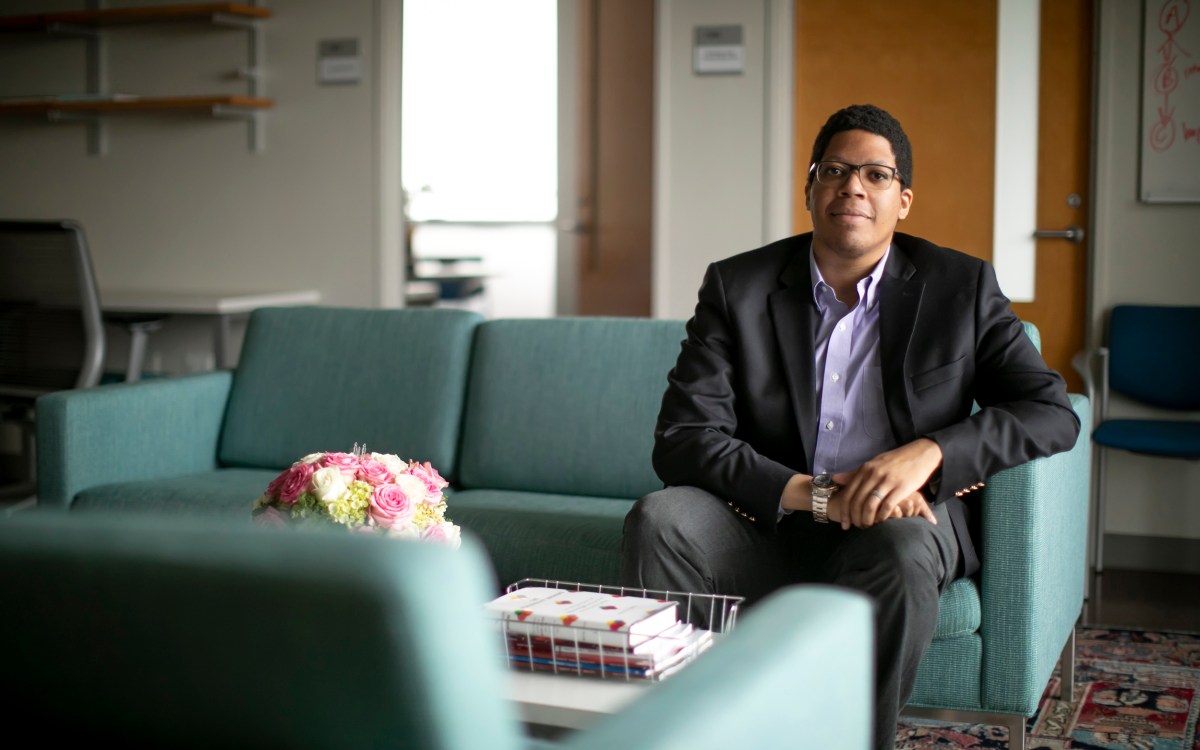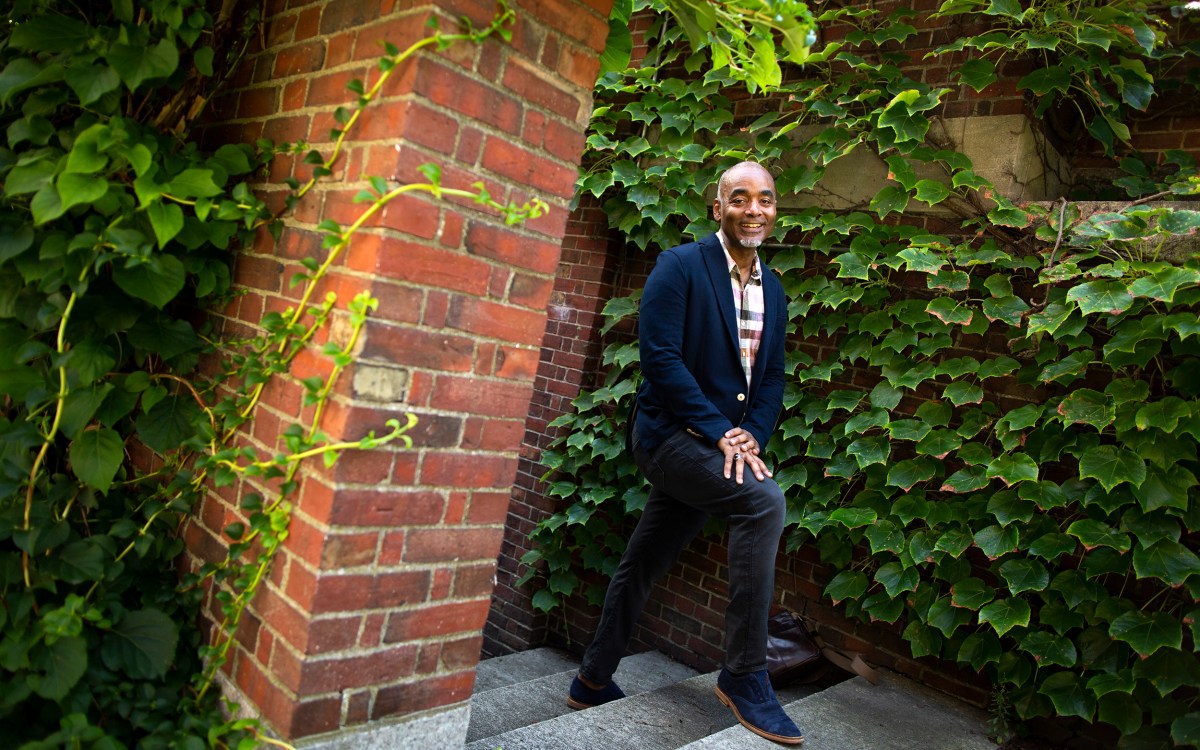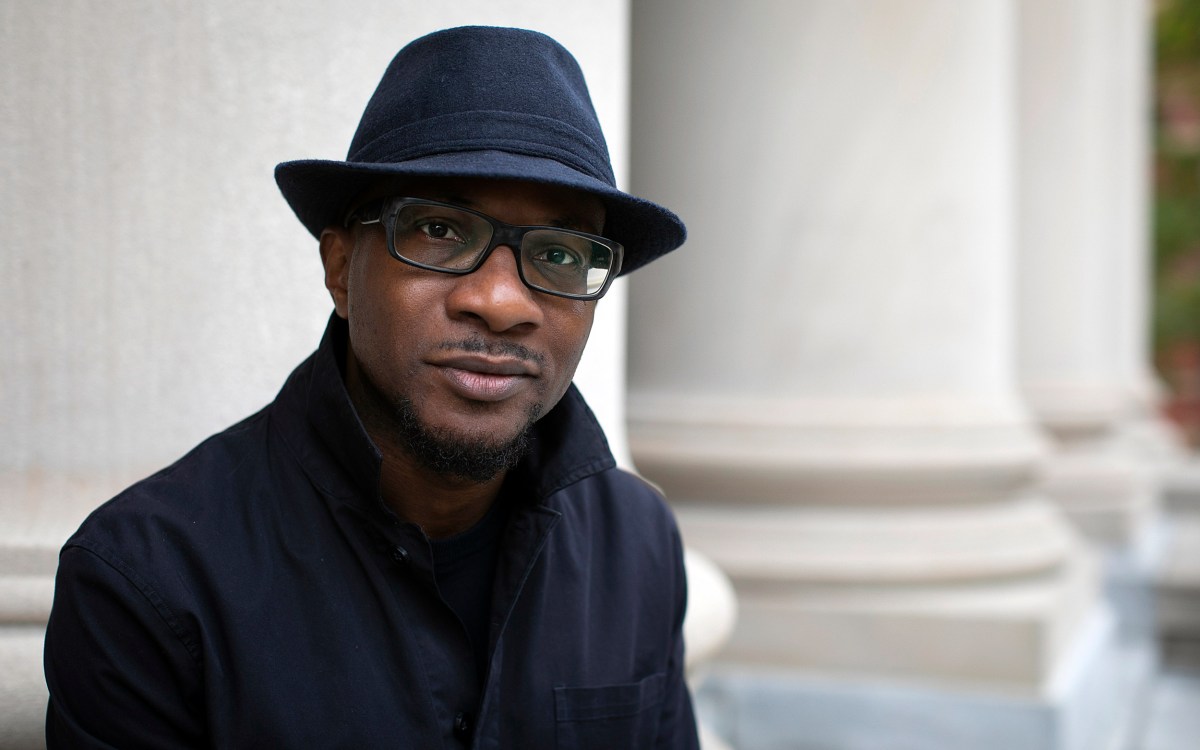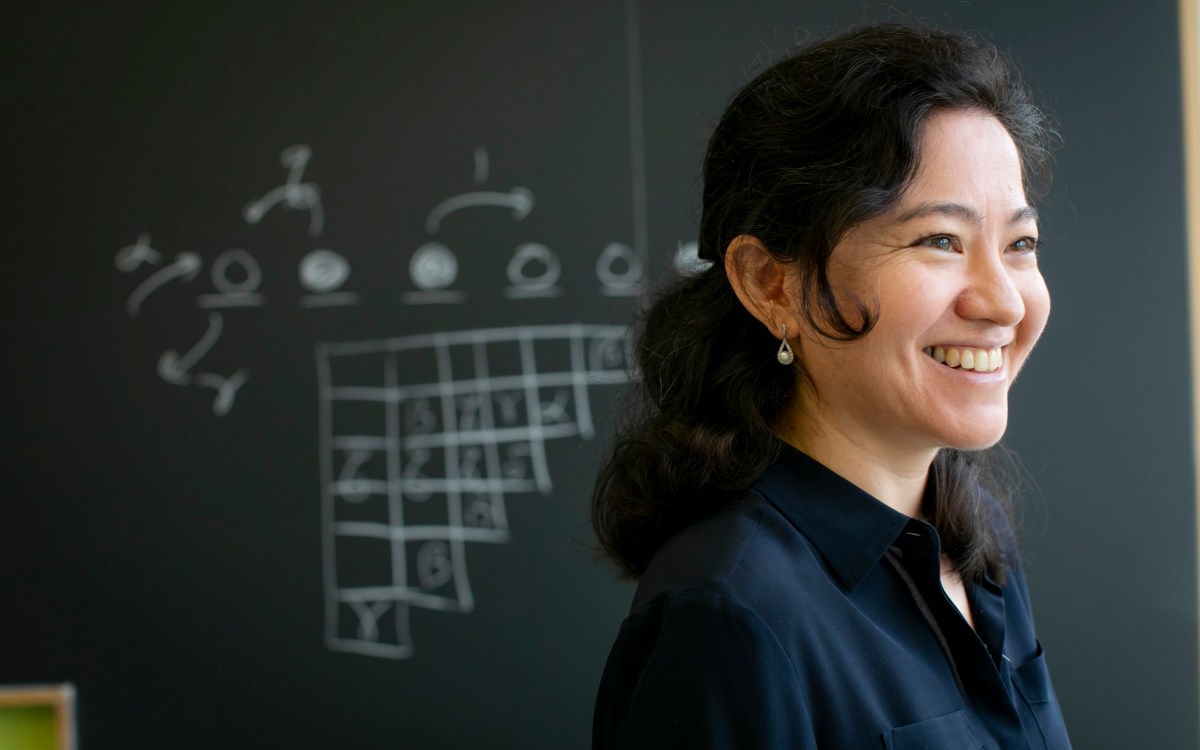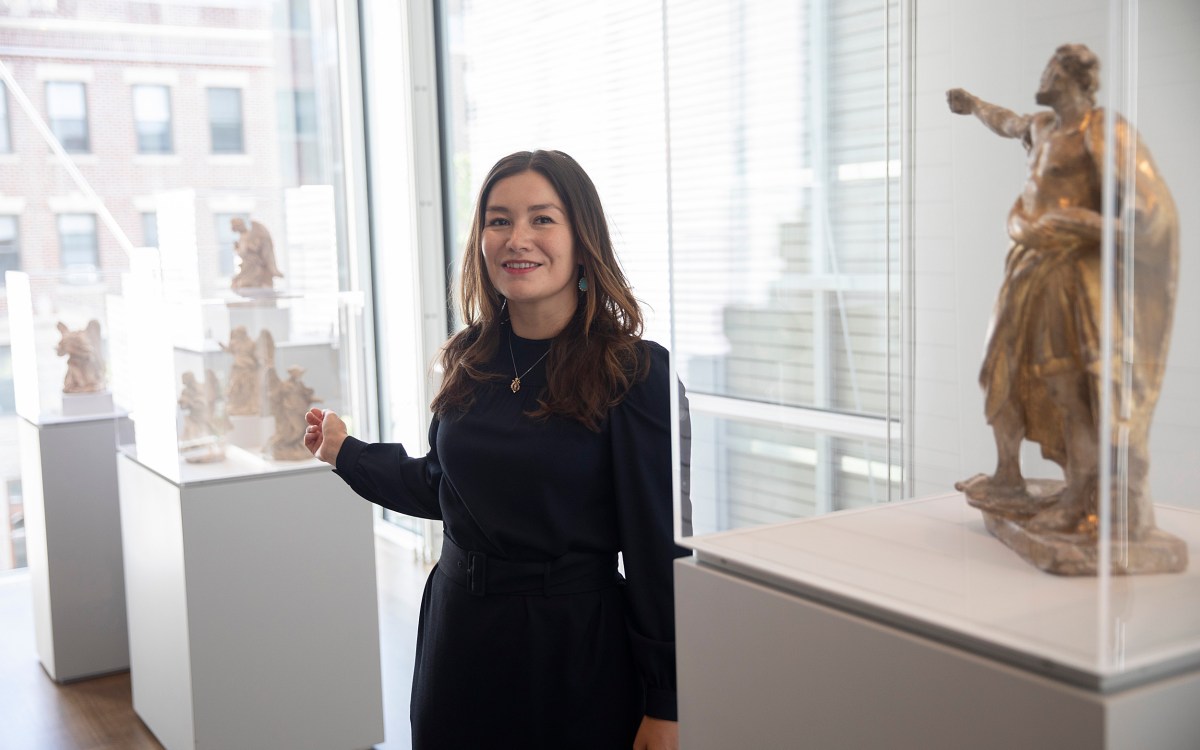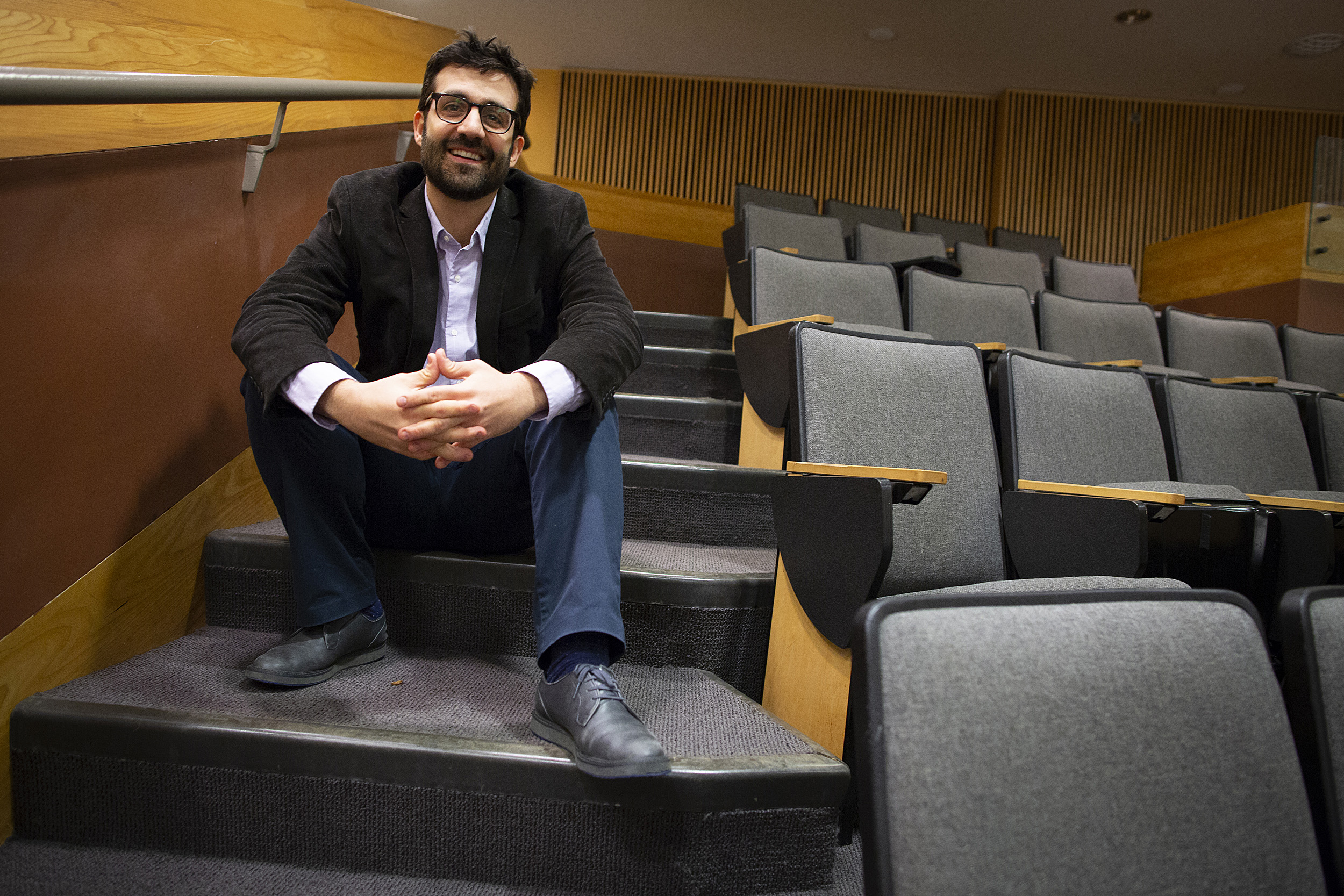
Stephanie Mitchell/Harvard Staff Photographer
New faculty: Bruno Carvalho
Romance languages and literature scholar is leading an effort to create a secondary field in urban studies
This article is part of a series introducing new faculty members.
Bruno Carvalho has published research on topics ranging from environmental justice and race to city planning and literature. His award-winning “Porous City: A Cultural History of Rio de Janeiro” made the case for his native city as a place of cultural history defined by porous spaces and structural inequalities. Carvalho earned his Ph.D. in Romance Languages and Literatures at The Graduate School of Arts and Sciences in 2009. He is co-editor of the book series “Lateral Exchanges,” about architecture and urbanism in a global context.
Q&A
Bruno Carvalho
GAZETTE: Can you talk about your research?
carvalHo: My research is a bit wide-ranging, but it broadly focuses on cities as lived and imagined spaces, especially in Brazil. I’m beginning work on a cultural history of futures. We can think of much of modernity in terms of competing visions of what the future ought to be like. In contrast, today, with the realities of climate change and labor precarity setting in, it often seems as if a dreadful future is inevitable. In the 1920s, for example, some vied for car-centric and highly segregated cities, others for mixed-race, multicultural utopias. Urban visions have become in many ways more modest and contingent. Contemporary urbanism absorbed important lessons from the failures of top-down, authoritarian, modernist projects, and though that’s of course a good thing, the daunting scale of our challenges demands that we conceive transformations with imagination and ambition.
Reflecting on how the future was conceived in the past can help to expand the realm of possibilities. Most of my research brings together perspectives from the social sciences, design, and cultural materials. Art, literature, film, and historical knowledge can all push us to confront entrenched intuitions and stretch the limits of the thinkable. We shouldn’t assume that cities are doomed to the levels of segregation so common in the United States today, nor that this will solve itself. The study of the past can act as an antidote to a type of conformity that our dire problems sometimes produce.
A lot of people already get that a certain status quo is untenable, whether it’s fossil-fuel dependency, hyper-concentration of wealth, or the war on drugs. But as I like to remind my students, if the scale of needed changes seem unviable, unforeseen social, political, and technological transformations happen as a norm.
I also have a body of research on the 18th-century period, which includes publications on topics like the emergence of anti-black racism in scientific thought, and on how the circulation of French translations of U.S. constitutional documents played a role in failed independence movements in Brazil. The Enlightenment sometimes appears to nonspecialists as this pivotal, but sort of flattened phenomenon — in some circles tied to progress and freedom, in others to Eurocentrism and exploitation. Rethinking the Enlightenment from the perspective of Brazil helps to foreground some of its tensions and contradictions, and allows us to trace the formation of modern ideas about sovereignty and individual liberty, as well as about race and white supremacy, cities as harbingers of civilization, and nature as a resource rather than something to which we belong.
GAZETTE: Last fall, you taught a seminar called “Writing and Urban Life”; this spring you’ll teach a graduate seminar called “Imagine Futures,” and you have a Gen Ed course debuting in two years. What are they about?
carvalHo: The fall seminar was a great welcome to Harvard. It brought together a wonderful group of graduate and undergraduate students. Writing and urbanization have entangled histories, and have become central to the very ways in which we constitute subjecthood in the modern world. Both are relatively recent developments in our history as a species. We discussed some very large questions and reviewed canonical debates, but we also concentrated on a set of authors from the past century or so, mostly from Brazil, who in various ways push us to “denaturalize” a lot of what we tend to take for granted about urban life. Much of the writing we analyzed is attuned to the strangeness in familiar modes of being, as well as to the perils, promises, and potentials of this massive experiment in which urbanites are now engaged: living closely in density among strangers. That’s just not how most humans before us did it.
This spring’s seminar will look at how past ideas of what the future should look like have helped to shape cities in all sorts of material ways — say, for example, associations between order and progress with geometric patterns like the grid. We’ll also try to recover ideas that largely lost out but can resonate today, such as challenges to human exceptionalism that contemplate the place of other life forms in the worlds we’ve built. We will discuss how in the history of planning, the unplanned and even the improbable happen often, and how the future is, by definition, out of reach and, therefore, always in a way imagined. We will focus on Brazil, the country; like the Americas as a whole, it’s a fertile space to generate these reflections because so many futures were projected on it throughout colonial and modern history. Brazil has been alternatively conceived as Edenic and dystopian. We’ll focus on historical turning points in urbanization and culture and try to understand their specificities, but we won’t lose sight of our current predicaments. After all, our collective planetary futures are very much at stake in regions like the Amazon, which is now a contested site for different visions of what the world ought to be like.
Next academic year when Neil Brenner, professor of urban theory at GSD, is back from sabbatical, we will co-teach a Gen Ed course called “Living in an Urban Planet.” So even though it’s already a cliché to say that more than half of the world population lives in cities, we actually tend to underestimate how much of the planet urbanization encompasses. If we think of energy systems and refuse, for example, or even the circulation of urban cultural production, where do our cities end? In this course we will discuss urban transformations at various scales, from the planetary to the sidewalk. It’s been stimulating to work with Neil on this. We share a number of interests, and tend to approach related questions in very different but complementary ways.
Gazette: You are leading an effort to create a secondary field in urban studies, something you were involved in at Princeton. Is it meant to be a cross-disciplinary effort, and what kinds of conversations do you hope will come from it?
carvalHo: My dream is to build a program in urban studies like our cities at their best: places of intellectual exploration, encounters with difference, lively exchanges. Urban experiences, much like a liberal arts education, can expose us to multiple ways of being and belonging in the world. They can move us to step outside of ourselves, to inhabit multiple perspectives, to exceed our assigned roles. Because there are already so many wonderful urban-related courses, and because there is no formal urban studies curriculum outside of the professional schools, we have the opportunity to build something really special. An urban studies curriculum can bring together students and faculty with mutual interests, but whose paths might not cross otherwise. At Princeton, we built a thriving program, and saw how it had transformative potential, especially for undergrads. Urban studies can introduce students to very basic facts about the world around them that they might not otherwise learn, like the role of segregatory housing in the U.S. wealth gap. It can introduce issues like inequality in resonant ways. Urban studies presents opportunities for poets and engineers to discuss different standards for value, or for anthropologists and computer scientists to rigorously debate the blind spots and uses of big data or GIS.
An institutional space around the urban could help us to break down siloes, building links across disciplinary and geographic boundaries. Neil, Eve Blau (GSD), and I are working with several colleagues on addressing some of these issues by reviving the Harvard Mellon Urban Initiative, which Eve and Julie Buckler, Samuel Hazzard Cross Professor of Slavic Languages and Literatures and of Comparative Literature, created as part of a grant funded by the Mellon Foundation.
GAZETTE: There has been so much challenging news coming out of Brazil, from the devastating National Museum fire to the recent presidential election. What are your thoughts about the cultural future of your homeland?
carvalHo: Brazil’s cultural landscapes are full of dynamism and utopian yearnings that have worked to destabilize structures of inequality, broadening the horizons of possibility. As elsewhere, we have recently seen extremist political movements take advantage of a very understandable sense of disillusionment and frustrations with futures that never arrived. Early in Brazil’s election, when not many expected surprises, I wrote a long essay on the appeal of politicians positioning themselves as anti-establishment, promising a return to a fantasy-based past, and of groups that have turned digital tools like YouTube and WhatsApp into engines for far-right radicalization and for the spread of misinformation. I think we cannot underestimate the grave threats to the environment, to a free press, to research and education and to vulnerable populations in Brazil, including indigenous groups. But there are many people fighting for democracy too.
The least important thing is setting ourselves up to say “I told you so.” We have to continue standing up for evidence-based approaches to our problems, but that won’t be enough. We also need to nurture alternative, inclusive visions for the future. One person who did that brilliantly was Marielle Franco, a young, Afro-Brazilian native of a Rio de Janeiro favela who was elected to the city council and was assassinated last year. Sidney Chalhoub (professor of history and African and African American studies) and I are planning an event here at Harvard with feminist leaders and former colleagues to celebrate her legacy. We do not yet know for certain who was behind her murder, but we know that the last electoral cycle empowered some individuals who mocked or made light of her death.
There are also renewed threats to the Amazon in growing deforestation and attacks on indigenous people. Brian Farrell, director of the David Rockefeller Center for Latin American Studies, Monique and Philip Lehner Professor for the Study of Latin America, and professor of biology; postdoc Bruno de Medeiros; and I are collaborating on a conference called “Amazonia and Our Planetary Futures.” We are assembling specialists from government, the private sector (including biodiversity economies), scientists, and indigenous leaders. It’s all hands on deck to avert catastrophe and create better futures!



